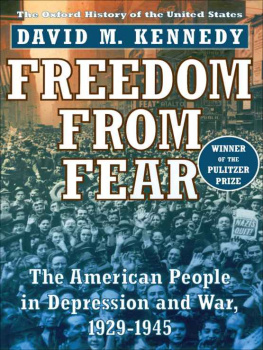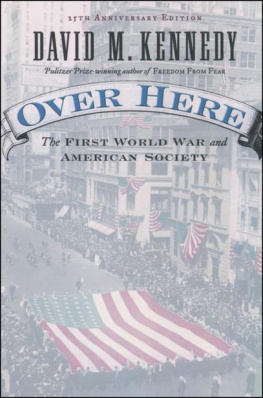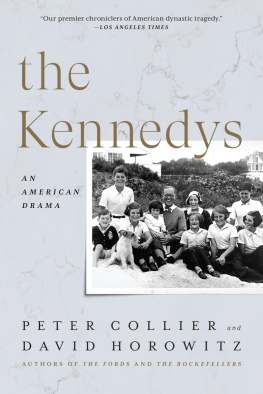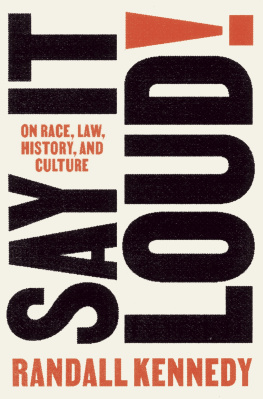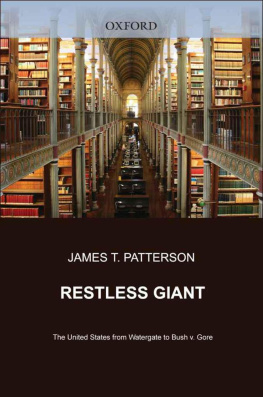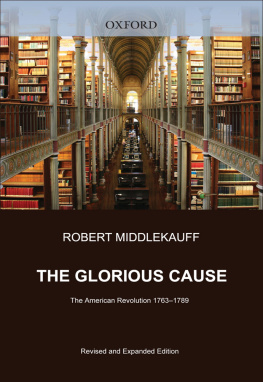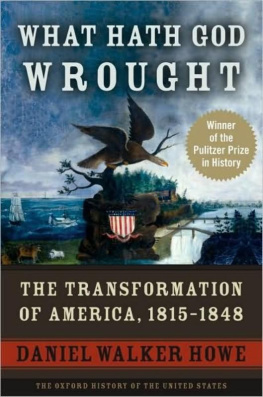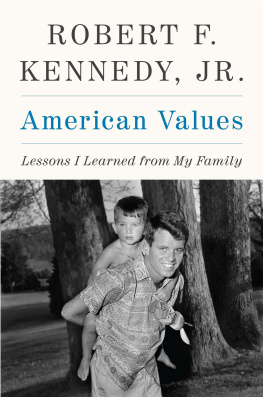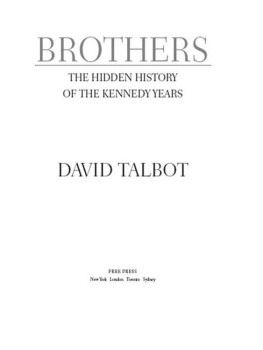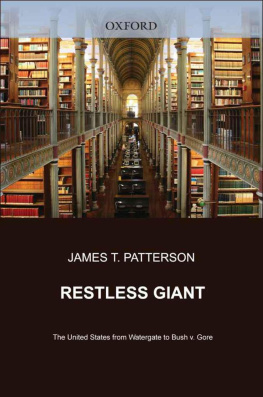Freedom from Fear
The Oxford History of the United States
C. Vann Woodward, General Editor
Volume III
ROBERT MIDDLEKAUFF
THE GLORIOUS CAUSE
The American Revolution, 17631789
Volume VI
JAMES MCPHERSON
BATTLE CRY OF FREEDOM
The Civil War Era
Volume IX
DAVID M. KENNEDY
FREEDOM FROM FEAR
The American People in Depression and War, 19291945
Volume X
JAMES T. PATTERSON
GRAND EXPECTATIONS
The United States, 19451974
FREEDOM FROM FEAR
The American People in Depression and War, 19291945
DAVID M. KENNEDY

Oxford University Press
Oxford New York
Athens Auckland Bangkok Bogot Buenos Aires Calcutta
Cape Town Chennai Dares Salaam Delhi Florence Hong Kong Istanbul
Karachi Kuala Lumpur Madrid Melbourne Mexico City Mumbai
Nairobi Paris So Paulo Shanghai Singapore Taipei Tokyo Toronto Warsaw
and associated companies in
Berlin Ibadan
Copyright 1999 by David M. Kennedy
First published by Oxford University Press, Inc., 1999
198 Madison Avenue, New York, New York 10016
First issued as an Oxford University Press paperback, 2001
Oxford is a registered trademark of Oxford University Press
All rights reserved. No part of this publication may be reproduced, stored in a retrieval system, or transmitted, in any form or by any means, electronic, mechanical, photocopying, recording, or otherwise, without the prior permission of Oxford University Press.
Library of Congress Cataloging-in-Publication Data
Kennedy, David M.
Freedom from fear: the American people in depression and war, 19291945
/David M. Kennedy.
p. cm.(The Oxford history of the United States: v. 9)
Includes bibliographical references and index.
ISBN 0195038347 (Cloth)
ISBN 0195144031 (Pbk.)
1. United StatesHistory19291933.
2. United StatesHistory19331945.
I. Title. II. Series.
E173.094 vol. 9 [E801] 973 sdc21 [973.91] 98-49580
1 2 3 4 5 6 7 8 9 10
Printed in the United States of America on acid-free paper
This book is for Ben, Bess, and Tom
qui laetificant vitam meam.
Contents
Maps
Acknowledgments
In writing this book I have drawn on a rich body of scholarship and imposed on the kindness of a great many colleagues, friends, and kin. I want to say a special word of appreciation for the pioneering work on the New Deal era by a remarkable generation of scholars, including John Morton Blum, James MacGregor Burns, Kenneth S. Davis, Frank Freidel, William E. Leuchtenburg, and Arthur M. Schlesinger Jr. Though I sometimes disagree with their emphases and evaluations, they laid the foundation on which all subsequent study of that period has built, including my own. I also learned much about World War II from the veterans with whom I traveled to battlefields in Italy, the Solomon Islands, and Normandy. For their service to their country, and for their generosity to me, I thank them.
Several research assistants have given me invaluable help: Leslie Berlin, Elizabeth Kopelman Borgwardt, Mark Brilliant, Kyle Graham, Tom Jackson, Sean Malloy, John McGreevy, and Jonathan Schoenwald. Their contributions and the comments of participants in Stanford's facultygraduate student American History Workshop have greatly improved this book.
Stanford University granted me two research leaves, one spent at the Center for Advanced Study in the Behavioral Sciences, the other at the Stanford Humanities Center, both partly financed by the National Endowment for the Humanities, which greatly facilitated my research and writing. The Harmsworth Family, the Faculty of Modern History, and the Provost and Fellows of Queen's College, Oxford, provided material support and stimulating collegiality during a year I spent as the Harms-worth Professor of American History at Oxford University. A seminar I co-taught there with John Rowett of Brasenose College proved particularly helpful in shaping my thinking about the New Deal.
I am especially indebted to Jack Beatty of the Atlantic Monthly, James T. Patterson of Brown University, and James J. Sheehan of Stanford University, each of whom read the entire manuscript, rescued me from innumerable errors and infelicities, and challenged me to think harder and write more clearly. Co-teaching a course on World War II with my Stanford colleague Jim Sheehan has contributed substantially to my work on this project, not least because of his example of deeply thoughtful scholarship and inspired teaching. I also want to thank others who acceded to my requests to comment on various parts of the manuscript: Barton J. Bernstein, Lizabeth Cohen, Paul David, Peter Duus, James Kloppenberg, Karen Sawislak, and Gavin Wright. Henry Archer rescued me from countless mistakes.
Sheldon Meyer at Oxford University Press first asked me to undertake this book, and his wisdom and counsel, not to mention patience, cheer, and good company, have sustained me over the years of work on it, as have the invariably thoughtful commentaries of the general editor of the Oxford History of the United States, C. Vann Woodward. Joellyn Ausanka, India Cooper, and Susan Day provided the excellent editorial support for which Oxford Press is justly renowned.
My wife, Judy, read the entire manuscript, endured life as a writer's widow, and provided unflagging support. Our three children, Ben, Bess, and Tom, grew up with this book, and to them I lovingly dedicate it, with the hope that this history may prove useful to their voyage, and their generation's, into the future.
Stanford, California
July 4, 1998
David M. Kennedy
Editor's Introduction
The brief period from 1929 to 1945 is unique in American history for its complexities of change and violence of contrasts. People who lived through the years of the Great Depression, the New Deal, and the Second World Waronly half the years normally assigned to one generationexperienced more bewildering changes than had several generations of their predecessors. These changes included a transition from economic and social paralysis to unprecedented outbursts of national energy, the emergence from wretched years of poverty to unparalleled levels of prosperity, and the repudiation of a century-and-a-half of isolation as America entered World War II.
Events of this magnitude and global significance make extraordinary demands upon the historian. Fortunately, David M. Kennedy is richly endowed with the talents and skills required by his challenging taskplus gifts as a writer. He is not the kind of historian who dwells upon abstract "forces." His emphasis is upon peoplenot only leaders but followers and opponents as well as victims and beneficiaries. Readers of Freedom from Fear will encounter vivid portraits not only of American statesmen and commanders, but of their foreign counterparts as well. Their decisions, errors, blunders, and such measures of luck as shaped the course of history are given due attention, but not to the neglect of the people who suffered or endured the results.
It was the people who suffered in the Great Depression that receive David Kennedy's primary attention, and more of them did suffer, and more deeply, and longer, than has been generally assumed. Southern white sharecroppers, for example, averaged an annual cash income of $350, black sharecroppers $294. At wages of $1 a day miners subsisted on a diet suggesting that of domestic animals. Emaciated children who never tasted milk wandered the streets, some shoeless in winter, too poorly clad to go to school. Milch cows dried up for lack of feed, and starving horses dropped in their harnesses. More surprising than the people's despair was their prevailing submissiveness. Their creed of individualism may account for much of this: If success and prosperity were due to merit and striving, failure and poverty must be due to the lack of them. Much more common than rebellion among Americans of those years was a sense of shame and a loss of self-respect. Year after year of depression went by with little or no sign of the recovery promised by politicians.
Next page
